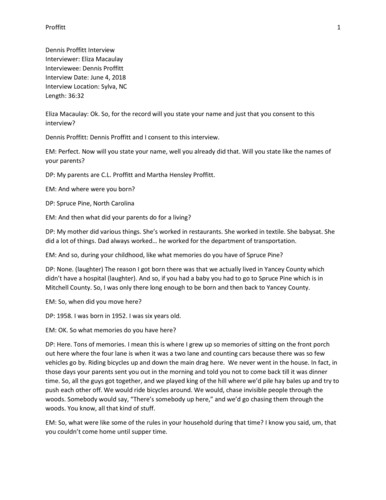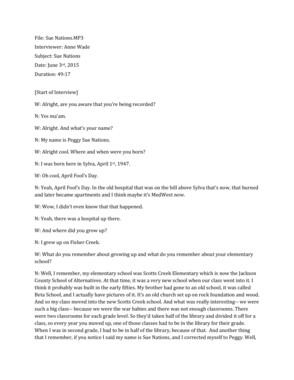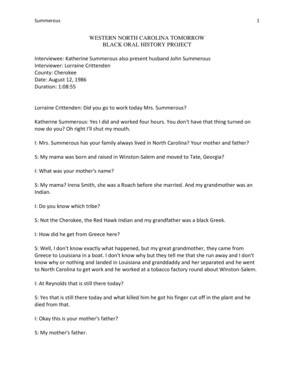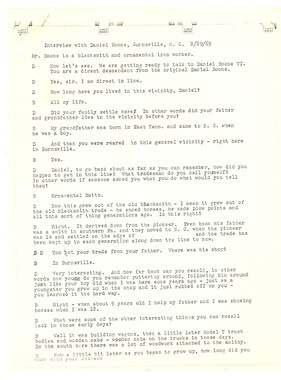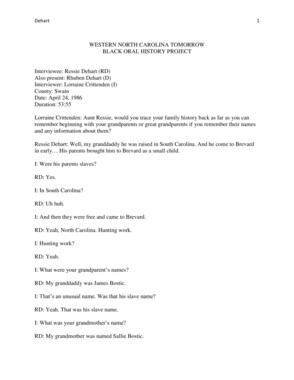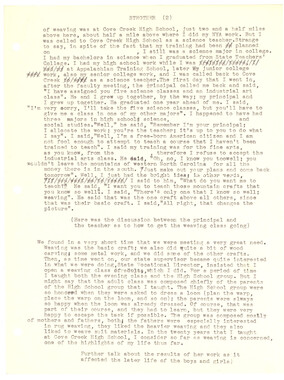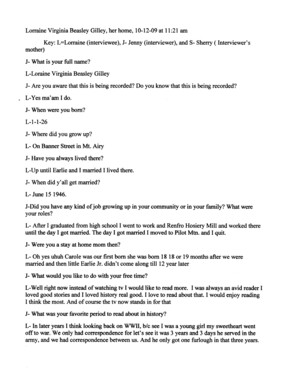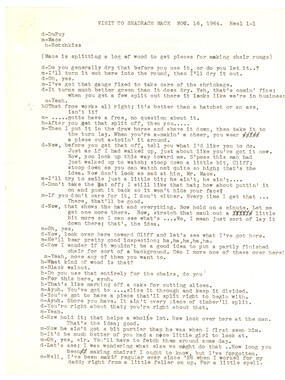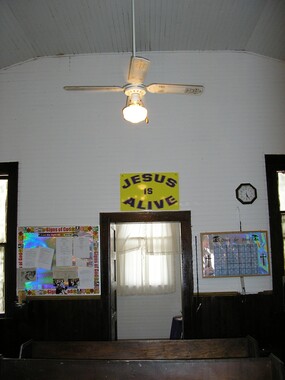Western Carolina University (20)
View all
- Canton Champion Fibre Company (2308)
- Cherokee Traditions (293)
- Civil War in Southern Appalachia (165)
- Craft Revival (1942)
- Great Smoky Mountains - A Park for America (2767)
- Highlights from Western Carolina University (430)
- Horace Kephart (941)
- Journeys Through Jackson (154)
- LGBTQIA+ Archive of Jackson County (26)
- Oral Histories of Western North Carolina (314)
- Picturing Appalachia (6772)
- Stories of Mountain Folk (413)
- Travel Western North Carolina (160)
- Western Carolina University Fine Art Museum Vitreograph Collection (129)
- Western Carolina University Herbarium (92)
- Western Carolina University: Making Memories (708)
- Western Carolina University Publications (2283)
- Western Carolina University Restricted Electronic Theses and Dissertations (146)
- Western North Carolina Regional Maps (71)
- World War II in Southern Appalachia (131)
University of North Carolina Asheville (6)
View all
- Allanstand Cottage Industries (62)
- Appalachian National Park Association (53)
- Bennett, Kelly, 1890-1974 (1388)
- Berry, Walter (76)
- Brasstown Carvers (40)
- Carver, George Washington, 1864?-1943 (26)
- Cathey, Joseph, 1803-1874 (1)
- Champion Fibre Company (233)
- Champion Paper and Fibre Company (297)
- Cherokee Indian Fair Association (16)
- Cherokee Language Program (22)
- Crowe, Amanda (40)
- Edmonston, Thomas Benton, 1842-1907 (7)
- Ensley, A. L. (Abraham Lincoln), 1865-1948 (275)
- Fromer, Irving Rhodes, 1913-1994 (70)
- George Butz (BFS 1907) (46)
- Goodrich, Frances Louisa (120)
- Grant, George Alexander, 1891-1964 (96)
- Heard, Marian Gladys (60)
- Kephart, Calvin, 1883-1969 (15)
- Kephart, Horace, 1862-1931 (313)
- Kephart, Laura, 1862-1954 (39)
- Laney, Gideon Thomas, 1889-1976 (439)
- Masa, George, 1881-1933 (61)
- McElhinney, William Julian, 1896-1953 (44)
- Niggli, Josephina, 1910-1983 (10)
- North Carolina Park Commission (105)
- Osborne, Kezia Stradley (9)
- Owens, Samuel Robert, 1918-1995 (11)
- Penland Weavers and Potters (36)
- Roberts, Vivienne (15)
- Roth, Albert, 1890-1974 (142)
- Schenck, Carl Alwin, 1868-1955 (1)
- Sherrill's Photography Studio (2565)
- Southern Highland Handicraft Guild (127)
- Southern Highlanders, Inc. (71)
- Stalcup, Jesse Bryson (46)
- Stearns, I. K. (213)
- Thompson, James Edward, 1880-1976 (226)
- United States. Indian Arts and Crafts Board (130)
- USFS (683)
- Vance, Zebulon Baird, 1830-1894 (1)
- Weaver, Zebulon, 1872-1948 (58)
- Western Carolina College (230)
- Western Carolina Teachers College (282)
- Western Carolina University (1794)
- Western Carolina University. Mountain Heritage Center (18)
- Whitman, Walt, 1819-1892 (10)
- Wilburn, Hiram Coleman, 1880-1967 (73)
- Williams, Isadora (3)
- Cain, Doreyl Ammons (0)
- Crittenden, Lorraine (0)
- Rhodes, Judy (0)
- Smith, Edward Clark (0)
- Appalachian Region, Southern (2399)
- Asheville (N.C.) (1917)
- Avery County (N.C.) (26)
- Blount County (Tenn.) (161)
- Buncombe County (N.C.) (1671)
- Cherokee County (N.C.) (283)
- Clay County (N.C.) (555)
- Graham County (N.C.) (233)
- Great Smoky Mountains National Park (N.C. and Tenn.) (510)
- Haywood County (N.C.) (3522)
- Henderson County (N.C.) (70)
- Jackson County (N.C.) (4692)
- Knox County (Tenn.) (25)
- Knoxville (Tenn.) (12)
- Lake Santeetlah (N.C.) (10)
- Macon County (N.C.) (420)
- Madison County (N.C.) (211)
- McDowell County (N.C.) (39)
- Mitchell County (N.C.) (132)
- Polk County (N.C.) (35)
- Qualla Boundary (981)
- Rutherford County (N.C.) (76)
- Swain County (N.C.) (2113)
- Transylvania County (N.C.) (247)
- Watauga County (N.C.) (12)
- Waynesville (N.C.) (73)
- Yancey County (N.C.) (72)
- Aerial Photographs (3)
- Aerial Views (60)
- Albums (books) (4)
- Articles (1)
- Artifacts (object Genre) (228)
- Bibliographies (1)
- Biography (general Genre) (2)
- Cards (information Artifacts) (38)
- Clippings (information Artifacts) (191)
- Crafts (art Genres) (622)
- Depictions (visual Works) (21)
- Design Drawings (1)
- Drawings (visual Works) (184)
- Envelopes (73)
- Facsimiles (reproductions) (1)
- Fiction (general Genre) (4)
- Financial Records (12)
- Fliers (printed Matter) (67)
- Glass Plate Negatives (381)
- Guidebooks (2)
- Internegatives (10)
- Interviews (812)
- Land Surveys (102)
- Letters (correspondence) (1013)
- Manuscripts (documents) (619)
- Maps (documents) (177)
- Memorandums (25)
- Minutes (administrative Records) (59)
- Negatives (photographs) (5835)
- Newsletters (1285)
- Newspapers (2)
- Occupation Currency (1)
- Paintings (visual Works) (1)
- Pen And Ink Drawings (1)
- Periodicals (193)
- Personal Narratives (10)
- Photographs (12976)
- Plans (maps) (1)
- Poetry (7)
- Portraits (1960)
- Postcards (329)
- Programs (documents) (151)
- Publications (documents) (2237)
- Questionnaires (65)
- Scrapbooks (282)
- Sheet Music (2)
- Slides (photographs) (402)
- Songs (musical Compositions) (2)
- Sound Recordings (796)
- Specimens (92)
- Speeches (documents) (15)
- Tintypes (photographs) (8)
- Transcripts (322)
- Video Recordings (physical Artifacts) (23)
- Vitreographs (129)
- Text Messages (0)
- A.L. Ensley Collection (275)
- Appalachian Industrial School Records (7)
- Appalachian National Park Association Records (336)
- Axley-Meroney Collection (2)
- Bayard Wootten Photograph Collection (20)
- Bethel Rural Community Organization Collection (7)
- Blumer Collection (5)
- C.W. Slagle Collection (20)
- Canton Area Historical Museum (2110)
- Carlos C. Campbell Collection (282)
- Cataloochee History Project (65)
- Cherokee Studies Collection (4)
- Daisy Dame Photograph Album (5)
- Daniel Boone VI Collection (1)
- Doris Ulmann Photograph Collection (112)
- Elizabeth H. Lasley Collection (1)
- Elizabeth Woolworth Szold Fleharty Collection (4)
- Frank Fry Collection (95)
- George Masa Collection (173)
- Gideon Laney Collection (452)
- Hazel Scarborough Collection (2)
- Hiram C. Wilburn Papers (28)
- Historic Photographs Collection (236)
- Horace Kephart Collection (861)
- Humbard Collection (33)
- Hunter and Weaver Families Collection (1)
- I. D. Blumenthal Collection (4)
- Isadora Williams Collection (4)
- Jesse Bryson Stalcup Collection (47)
- Jim Thompson Collection (224)
- John B. Battle Collection (7)
- John C. Campbell Folk School Records (80)
- John Parris Collection (6)
- Judaculla Rock project (2)
- Kelly Bennett Collection (1407)
- Love Family Papers (11)
- Major Wiley Parris Civil War Letters (3)
- Map Collection (12)
- McFee-Misemer Civil War Letters (34)
- Mountain Heritage Center Collection (4)
- Norburn - Robertson - Thomson Families Collection (44)
- Pauline Hood Collection (7)
- Pre-Guild Collection (2)
- Qualla Arts and Crafts Mutual Collection (12)
- R.A. Romanes Collection (681)
- Rosser H. Taylor Collection (1)
- Samuel Robert Owens Collection (94)
- Sara Madison Collection (144)
- Sherrill Studio Photo Collection (2558)
- Smoky Mountains Hiking Club Collection (616)
- Stories of Mountain Folk - Radio Programs (374)
- The Reporter, Western Carolina University (510)
- Venoy and Elizabeth Reed Collection (16)
- WCU Gender and Sexuality Oral History Project (32)
- WCU Mountain Heritage Center Oral Histories (25)
- WCU Oral History Collection - Mountain People, Mountain Lives (71)
- WCU Students Newspapers Collection (1744)
- Western North Carolina Tomorrow Black Oral History Project (69)
- William Williams Stringfield Collection (2)
- Zebulon Weaver Collection (109)
- African Americans (390)
- Appalachian Trail (35)
- Artisans (521)
- Cherokee art (84)
- Cherokee artists -- North Carolina (10)
- Cherokee language (21)
- Cherokee pottery (101)
- Cherokee women (208)
- Church buildings (167)
- Civilian Conservation Corps (U.S.) (110)
- College student newspapers and periodicals (1830)
- Dams (103)
- Dance (1023)
- Education (222)
- Floods (61)
- Folk music (1015)
- Forced removal, 1813-1903 (2)
- Forest conservation (220)
- Forests and forestry (1058)
- Gender nonconformity (4)
- Great Smoky Mountains National Park (N.C. and Tenn.) (181)
- Hunting (38)
- Landscape photography (10)
- Logging (103)
- Maps (84)
- Mines and mineral resources (8)
- North Carolina -- Maps (18)
- Paper industry (38)
- Postcards (255)
- Pottery (135)
- Railroad trains (71)
- Rural electrification -- North Carolina, Western (3)
- School integration -- Southern States (2)
- Segregation -- North Carolina, Western (5)
- Slavery (5)
- Sports (452)
- Storytelling (245)
- Waterfalls -- Great Smoky Mountains (N.C. and Tenn.) (66)
- Weaving -- Appalachian Region, Southern (280)
- Wood-carving -- Appalachian Region, Southern (328)
- World War, 1939-1945 (173)
Interview with Dennis Proffitt
Item
Item’s are ‘child’ level descriptions to ‘parent’ objects, (e.g. one page of a whole book).
-
-
Proffitt 1 Dennis Proffitt Interview Interviewer: Eliza Macaulay Interviewee: Dennis Proffitt Interview Date: June 4, 2018 Interview Location: Sylva, NC Length: 36:32 Eliza Macaulay: Ok. So, for the record will you state your name and just that you consent to this interview? Dennis Proffitt: Dennis Proffitt and I consent to this interview. EM: Perfect. Now will you state your name, well you already did that. Will you state like the names of your parents? DP: My parents are C.L. Proffitt and Martha Hensley Proffitt. EM: And where were you born? DP: Spruce Pine, North Carolina EM: And then what did your parents do for a living? DP: My mother did various things. She’s worked in restaurants. She worked in textile. She babysat. She did a lot of things. Dad always worked… he worked for the department of transportation. EM: And so, during your childhood, like what memories do you have of Spruce Pine? DP: None. (laughter) The reason I got born there was that we actually lived in Yancey County which didn’t have a hospital (laughter). And so, if you had a baby you had to go to Spruce Pine which is in Mitchell County. So, I was only there long enough to be born and then back to Yancey County. EM: So, when did you move here? DP: 1958. I was born in 1952. I was six years old. EM: OK. So what memories do you have here? DP: Here. Tons of memories. I mean this is where I grew up so memories of sitting on the front porch out here where the four lane is when it was a two lane and counting cars because there was so few vehicles go by. Riding bicycles up and down the main drag here. We never went in the house. In fact, in those days your parents sent you out in the morning and told you not to come back till it was dinner time. So, all the guys got together, and we played king of the hill where we’d pile hay bales up and try to push each other off. We would ride bicycles around. We would, chase invisible people through the woods. Somebody would say, “There’s somebody up here,” and we’d go chasing them through the woods. You know, all that kind of stuff. EM: So, what were like some of the rules in your household during that time? I know you said, um, that you couldn’t come home until supper time. Proffitt 2 DP: Yeah. That was a rule. Rules, well. You always came to dinner when it was called, We didn’t eat till we had our prayer. The TV was off and so we didn’t turn the tv on and you didn’t leave the table until you got permission to leave the table. “May I leave the table?” And those rules lasted till, probably till we got to teenage years and then we kind of fudged a little bit. (laughter) You know parents get tired as they get older. We could, we were allowed to go around the neighborhood as long as we were home on time. When we got older there was a time when we had to be in. So, actually, when I met my wife, I was a senior. She was a freshman. And I don’t think I got to date her for a year or so but anyway. She actually got to stay out later than I did so I’d have to take her home so that I could get home on time. So, some of those kinds of rules. EM: And so, how has Sylva liked changed since that time? I know you said that the two lanes became a four lane now and you used to ride your bike on that road. And that’s probably not… (laughter) DP: No. Well, you know, the population has grown as Western Carolina has grown. When I was in school there, I think they were trying to get to four thousand people. So that increased it and then of course SCC was built in my lifetime and that, that changed some things. The stores downtown changed, you know, now we have restaurants down there. When they built the Sylva bypass the town of Sylva thought that was terrible. They thought that was going to take everybody out of town and in those days before the Sylva bypass everything, it was just, it was a bottle neck, you know. But they was ok with the business owners down there because they thought people were going to stop and shop which they didn’t do they were just trying to get through town. So, the type of businesses there, we had no fast foods back then. We had the Parkway Restaurant which is where the wings place is down there. Can’t remember the name of it. And then we had the Rebel Restaurant. And that was the first fast food and of course everybody circle… you went, that was the hang out, so you’d circle the Rebel Restaurant. So, most people in those days if you went out to eat you had to go to a neighboring county, you know. Of course, there was a church on every corner. Church is always a big part. I don’t think as many people go to church, you know. Church was the center of everybody’s life in those days and now it’s, it’s not, you know. People, they’re going places all the time and church is not as big of factor nowadays. That’s probably the biggest change. EM: So what elementary school did you attend? DP: I attended Sylva Elementary School which eventually became Fairview School. So, Fairview is a consolidated school of Sylva Webster and Savannah and Sylva was down there where Mark Watson Park is. And it was actually in two buildings because the high school use to be there too. So, you had… they were both two story buildings. So, you had K through 5 in, they didn’t have kindergarten, excuse me. One through five in one building; and six, seven and eight in the other building. EM: And so, you attended Sylva Webster? DP: I did. Yes. EM: So how has Sylva Webster like changed from Smoky Mountain. I know like the names changed. The mascots have changed, but what other changes have you noticed with that? DP: Well education has changed, and so discipline has changed and there’s more things for kids to do. In those days, it was chewing gum was a big thing, you know. Or cursing was a big thing. It’s not the things Proffitt 3 you have nowadays. I think kids were a little more active back in those days. There were very few sports in those days so now I don’t know how many sports they’ve got over there. Quite a few. EM: A Lot. (laughter) Yeah. DP: So, you didn’t have that. Of course, band was still a… it wasn’t a great big thing, but it got big when Bob Buckner got there. So, I guess more opportunities for children to do. That’s been a change and a lot of the mental, mental, I hate to call it mental illness. Mental, mental situations that kids have weren’t as many and in those days, it would be unusual for a child to have divorced parents. Most everybody lived with their biological parents and now that’s not the case. And now you have so many kids that are being raised by grandparents and great grandparents so that’s, that’s been a huge change. EM: So, when you attended these schools what were some of your most influential teachers that you had? DP: Well because I was into athletics my influence with teachers were actually coaches and, because my dad was the biggest influence on my life and I’d never met anybody like my dad till I met coaches. (laughter). And believe it or not I had an English teacher, a junior English teacher, David Fox. And I went through a silly period in my life where I thought I was a writer and I did some writing and I would… I wrote poetry and I would take it to him, and he would evaluate it for me and send it back and I’d redo it. But he actually, he helped me graduate from college because, we did term papers in his class and I don’t think they do term papers anymore. And so, he had us do that in the way that helped me when college, because you ended up have to do the same thing there so I would say those would be the biggest influences. EM: So what sports did you play when you attended high school? DP: Football, basketball and track. EM: So, you were busy? (laughter) DP: Yeah. EM: So, what are some of the memories you have from high school athletics and being on a team? DP: Well Babe Howell was my coach. So, he coached me and then I coached with him and you know, he’s in the North Carolina Hall of Fame and won five state championships. And so my coaching style that I coached I copied from him. So that was real influential. I think the people that you, you know this being an athlete yourself, the people that you play sports with you’re connected with them for a lifetime. You don’t know that part yet (laughter). But you’ll be seeing those people twenty, thirty years down the road and you’ll be talking about this game or that game or you’ll be talking about practice if you had a coach that just wore you out in practice, you’ll be talking about well this was nothing like practice. You know, that kind of thing. When I was there the football team won a state championship when I was a freshman and then it kind of declined and then it came back and they won more state championships. The basketball team was good. They never won a state championship, but they always got into the playoffs. And I played my junior and senior years and I did ok my sophomore year. I played my sophomore and junior year. I did ok on the JV team and my junior year I realized I probably wasn’t varsity material, so I didn’t play my senior year and I focused on track. The track was good. Dave Green was my coach and of course I ran track at Western so that helped me do that. Proffitt 4 EM: What did you run at Western? DP: I was a sprinter because anything that’s over 400 yards long,440 yards long I probably don’t need to run so I like the 100 and the 200. That was my thing. Anything short. EM: Yeah. I ran the 200. DP: Don’t you love that race? EM: Yeah. DP: I love the 200. Do you know down at The Citadel they used to… they had a 200 straightaway, 220 straightaway, 200 meter straight which is neat. And it was in those day we had cinder tracks. You’ve never seen a cinder track, but you had to have cleats yay long. It was nothing like modern day tracks. EM: Now they’re like this big (laughter). DP: In fact, we, at Western we did indoor track and they didn’t have, they’d really not invented indoor cleats at that time. We’d go over to the University of Tennessee and other places and we would actually take athletic tape, roll it up and stick it on the front of our shoes and they’re only good for one race but that’s how we did that. EM: So, you mentioned Babe Howell. Did you ever, like, coach a state championship with him? DP: Did not. Yes. 1980. I was on the coaching staff in 1980. EM: What was that like? DP: It was phenomenal. The great thing about that team, and since you’ve been on teams you know that every year, even though you’ve got the same players, it’s a little bit different. EM: Uh huh. DP: And the personality of the team…And so what happened with that group, we lost three of our first four games and so… and we had kids that wanted to quit, and kids would go get them back, you know. They’d go to their homes and say by golly you’re not quitting get your tail out here. And then after the fourth game we didn’t lose and won the 2A state championship in 1980. It was, it was great. And they weren’t, they weren’t great athletes on that team. I mean, obviously you had to have great athletes to play but they… when you looked at them it didn’t look like they were, you know. They were Division I players. I don’t know how many players off that team actually played college football. Whereas back in the ‘60s or in the ‘70s when we won state championships, you know y,ou had some Division I players there. EM: So, what made you choose WCU? I was looking through the yearbooks and I saw your picture… (laughter) DP: Oh! I’m sorry about that. (laughter). Well it was next door and we could afford it. EM: Um hm. Proffitt 5 DP: Yeah, I like being, I’m a home guy so I didn’t… had no interest in going off and living the dorm life. Things most kids want to do they want to get away from their parents. I didn’t need to get away from my parents, so I was happy here at home. EM: So what degree did you pursue? Like I know you ended up working in education but what degree did you pursue when you went there? I know you ended up working in education. DP: Yes, I did. Well once I started, got into football then I knew that’s what I wanted. I wanted to be a coach. And so I really wanted to coach and teach at the high school level until I did my internship. They didn’t call it an internship then it was student teaching. And I student taught here with Larry McDonald who probably had the most influence on my life. Lifelong friend, still my friend. Once I came here then I knew I wanted to be an elementary PE teacher. EM: So, what influenced you? I know you said Larry McDonald, but is there any other influence? Did any other people influence you to pursue that degree? DP: No, it was probably Mac. Well coach Howell of course because I was coaching and my senior year in high school, I was a student assistant which meant I pretty much taught his classes. That probably had the most influence on me and then when I got over here with Larry, I knew that I wanted to be an elementary PE teacher. EM: So how has Western changed since you’ve attended there? Since you’ve graduated? DP: Well it’s gotten bigger. EM: Mmm hmmm. DP: More departments. When I was there education was one of their biggest things, you know. They were, they started out as a teacher college and so they had that reputation and they still have a reputation. Even as a principal I loved hiring teachers from Western Carolina because I didn’t get a bad one. And they did a good job and I think they stayed current and they taught that you need to love kids which I, I think is very important. EM: So, during your time as a college student how, what…I know you said the Rebel Restaurant was a hangout spot. Was that still the primary spot when you were in college? DP: It decreased. (laughter). It decreased because that was more of a high school, redneck area. (laughter). College kids and rednecks don’t mix. (laughter) So, no. I think when you, when you go to college you end up eating on campus and staying on campus and of course Western’s always been, and I think it still is, it’s kind of a suitcase college so people go home on the weekends. EM: So, talking about education. So, you’ve played a strong role in public schools with being in the administration field so how do you think public schools have played a role in the community? DP: Well, community influences the school more than school influences community, I think. I think with Fairview School in particularly it’s a community school. People feel very comfortable coming here, you know. The new thing with keeping the schools locked up is a little bit hard for me to stomach. I see the significance of it, but it in one way it kind of infringes on that open arms, open school kind of thing. But I… how’s it influenced the community? I, well for one thing I think the teachers here do a good job and they put out a good product. And so the fact that the students who graduate from here are well Proffitt 6 educated and have options to go to many of the area colleges and be successful in life. And so, I think the fact that they do a good job here influences the community. EM: So, I know you taught here before you were a principal. What did you teach? DP: I taught physical education for twenty-four years, I guess. Something like that. Loved it. EM: So how long, well you just said that. Just kidding. (laughter) So what were some of the challenges you faced as an educator here? DP: Well you know for a long time… You were talking about how things changed. We didn’t have a whole lot of discipline problems here. Kids for the most part did well and if there was an issue with a kid you just called the parents and the parents took care of it. In those days if you got in trouble with the school you got in trouble at home. EM: Mmm hmm. DP: So that’s changed. In fact, I used to do some consulting. I’d travel around and do workshops all across the state and they always asked the question how to do you handle discipline in PE class. And I said well we don’t really have any problems and I think the reason we didn’t have any problems was we kept kids doing things that they enjoyed doing and it was planned and organized and so we didn’t, didn’t have any issues with that. EM: So, what were some of the fondest memories you have from teaching PE? What were some of your favorites? DP: Well, the kids that come through. You know, I taught here but also coached here and coached the basketball team which was a big, big thing here. And so I just, I think my memories are of individual kids and I love it now when I go out… and sometimes I don’t remember them but there’s always somebody coming up and they go, “Coach Proffitt” and I’ll go, “Hey” and they’ll tell me , “I appreciate this…It was so good when we did this” and then they’ll leave and I’ll go, “I wonder who that was.” (laughter) So, the individual kids are my biggest memory because I think all teachers want to see kids succeed and when I see them, they’ve grown up now. And some of them are grandparents, but they’re parents and they’re successful in life and that makes me feel good. One of the big things that , I mean the athletics. I really enjoyed coaching here. And we’ve always… And you know this you’ve played here. It’s always been a big thing here. Athletics have and we’ve gotten excited about it and we have pep rallies and all that good stuff. We support the orange. We also had an intramural program that was great. I mean it was just kind of renowned across the state. Before school, and we had a lot of kids involved in that. Which, I think we had a PE program. We didn’t just have a PE class we had a PE program and the intramurals and the athletics kind of tied into that and it was just very exciting. EM: Yeah. That sounds fun. So what intramural… I know you said before school. So what intramurals did you offer? DP: Well we started out, basketball. And then we had a weight machine up there and so we had weight shirts. 150-pound club, 200-pound shirts and so the kids would come in. We had a certain day and they could come lift weights. We did, gosh I can’t remember all of them we did. We did like a three on three contest. I think we even had a pool. We used to have pool tables here. We had a pool contest. I can’t remember if we had a ping pong or not. Just a number of things. We had it because it used to basketball Proffitt 7 just filled one of the sections and then we tried to have something for the whole year all in the morning. We even had an intramural newsletter that we sent, that we created. And we’d give trophies out and…for some of the winners. We had some contests. It was just great. EM: So, you were talking about how you loved hiring teachers from Western. In your opinion what makes a good teacher? DP: Well first of all they’ve got to love kids, okay? And they teach bell to bell, okay? And they’re creative in their teaching and their not workshop teachers and they’re not sitting at their desk and they’re moving around and they’re connected, connected with kids and they’re also connected with parents and so you’ll find that your better teachers are the ones that kids like and their parents like because they have relations they’ve developed, they’ve connected. They have relationships with those kids. But I just think they teach on a more creative level. It’s not just base stuff. EM: So, what made, after twenty-four years of teaching PE what made you decide to become an administrator and become a principal? DP: Well you’ll notice that a lot of coaches become principals and I think the reason is coaches are leaders and they like to lead. And so, you look around. I mean I was fortunate as a PE teacher. Every kid here had PE every day, so I got to see every kid everyday which I like. You get to influence a lot of people but as an administrator you get to, you get to influence people who influence students and you get to be the leader and I think that’s pretty exciting, you know. And your mamas going to do that. She’s going to take the school. She’s going to evaluate where it is today. In her mind she’s gonna go “We can do better.” You’ve probably heard her say that a time. (laughter) She’s going to say “We can do better.” And so she’s going to come up with a plan to move them from where she is to where she wants them to be and her way of thinking is no different than a coach when he takes on that team and he’s got to come up with a season or this team and he’s got to prepare them for that. He’s got to come up with a plan for that. That’s exciting stuff and, uh… that’s what leaders do. EM: So what process do you have to go through to become the principal of Fairview? DP: Well the same thing you mother did. First thing you have to do is you have to go back to get your Master’s degree. I have two Master’s degrees. I got my masters in PE and then I got my master’s in administration and then I got my National Boards. See your mother has more children than I have but going to school and teaching school and coaching…you do all that at the same time. It’s a lot of work. You know about that. You’ve seen your mother do that. You’ve got to get that, got to get that degree while you’re raising your kids, while you’re teaching school. And then you apply for a lot of jobs. I’m like a sheet. I’ve been turned down a lot. So I applied for several jobs I didn’t get which was good because I… the Lord puts you where he wants you to be. And so, I wouldn’t be here if the Lord hadn’t put me here. EM: So as principal what were some of the challenges you faced? DP: Well the first challenge you face is, especially if you’re the principal in the same school you taught at is you’re suddenly… you’re not a peer anymore. So, the first thing that happens is all those teachers that used to be your, they’re still your colleagues but they were your peers, if you understand what I mean. Alright? So now they’re not your peers so you’ve got to make that transaction, that’s not the right word, transition to that next level. So that’s the first challenge. The second challenge is you work with human beings and so not every human being is doing a good job. So you’ve got the, one of the things you’ve got Proffitt 8 to do is you have to put the right people in the right place and there’s some people that have to have a heart to heart with of you know you need to step it up, or you know, that kind of thing. Personnel, the biggest problem you have always is somebody you hand a check to. Personnel. The kids aren’t usually that big of a problem. The third thing you run into is resources. So, you’ve got to have resources, you know. As an administrator you want to create a situation, the best in the world, where teachers can teach, and students can learn. That’s what, that’s what it’s all about. Teachers can teach. Students can learn. And so it takes resources to do that and so sometimes you have to fight for your resources. EM: So, on the other side of that what were some of your successes as a principal? What were some of the highlights? DP: Well I hired good people. I hired good people, one of them is getting ready to be principal. (laughter) And when I look around some of those good people are still here. And so I think that’s success. We, when I first came here, we didn’t make what they call AYP at the time and so that became an issue. I visited a lot of schools. Read a lot of stuff. Made a few changes here, you know. We adopted a vocabulary we started changing our lesson plans and just several things…we did a number of things and then we made our growth and we made our AYP and so that was a success. I don’t know right off the cuff I can’t tell you about any others. EM: So how long were you a principal? DP: Six and a half years. I was an assistant principal one year and then principal for six and a half. EM: So, I know you spent this past year being back here helping out so how has Fairview changed since you’ve retired? DP: Well, I don’t see the excitement. The pride at the level, it’s still there but it’s not at the level that it was at. I’d like to see it get back to that, you know. First thing I did this year was had an assembly program. I like assemblies because it gets everybody together. You know, it’s us. It’s us together. And then we had a pep rally which apparently, they hadn’t been having some of those. So, I think getting the spirit back is the one thing that I’ve seen. One thing that I’ve seen that’s better, the counselors we have are, really, a little more involved. They run at the fire. Not everybody wants to run at the fire which I’ve been real impressed with that. EM: Do you have any other experiences that you… Do you have any other experiences that you had as principal that you’d like to share with us? DP: Well we had some challenging things and they, they have some this year too. I had mentioned about the mental health and I don’t like that term but anyway. Kids that have emotional issues or family issues or, they’re difficult to work with and so we had some of them when I was here, but we had some help that kind of came late. I see that as, I see that as an ongoing issue. How do you handle those disruptive kids? And I, there’s not an easy solution? And again, it comes down to resources, but I see more and more of those with the break-up of the family and with so many children being raised by grandparents and the drug children. The kids that are on the spectrum, you know. There’s just a lot of needy. There’s more needy kids now than I’ve seen before. There were needy kids then but there are more of them now. Proffitt 9 EM: So back to coaching. So, I know you said you coached football and you coached basketball. Did you coach any other sports? DP: Well, I’ve coached several. When I came here the only basketball, the only middle school sport they had was basketball and all the other ones I either started or was instrumental in starting. So the baseball, the softball, soccer. I even got the girls soccer. I’m glad they’ve got it back this year. We even had that twenty years ago for two seasons. And I actually coached the girls’ soccer team for a few games because I had to fire the coach and the funny thing about that was that I didn’t know anything about soccer. We had a game and I called timeout to talk to the girls and the referee come up to me and said, “there’s no timeout in soccer.” I’m like wow how do you talk to your team. I was trying to substitute, and I was hollering, “Sub, sub” and he comes over and says you can only sub at this… whatever times it was. But I’ve coached baseball and, and soccer and I’m not sure. That’s probably it at the middle school level. EM: What was, what is your favorite sport? DP: Football. EM: Football? DP: Football by far. Yeah. EM: So, have you coached any other ages. I know you talked about high school and middle school. Have you coached any other ages? DP: No, I have not. No, I actually coached my daughter’s… this was the biggest mistake I ever made. A friend of mine, we, our daughters were together and so we, they wanted to play softball in the summer time, and they didn’t have a coach, so we said we’d do it and it didn’t turn out good. (laughter) But no, I’ve not. EM: What’s your favorite middle school or high school? DP: Boy that’s a big one. You know I’ve always enjoyed high school. I like it a lot. But I enjoy my middle school time too. High school I guess because it’s a different level. Different caliber of athlete. You know in middle school you have kids that are trying sports out and so they may not be very good at it. JV ball at the high school, freshman. A lot of times you have kids that try sports out for the first time. The varsity level, really it’s nice. But I enjoyed, I enjoyed them all. I don’t know if I enjoyed one more than the other. EM: So, what, you were talking about how you won a state championship. What was your, probably your most successful was just wining the 2A. Do you have any other? DP: Well we, for a long time we coached, we’d never lost a playoff game at Sylva Webster. We had never lost a playoff game until 1976 they lost a playoff game to Canton. So, what was the question? EM: So, what are other successful seasons you’ve had? DP: Oh. But anyway, we had a winning season every year except there was one year that we, I think that we only won like three games or four games over there. But then the next year we were back in the Proffitt 10 state playoffs again, so we had a lot, a lot of successes there. If we only won, one year we only won seven ball games and that was like a bad season. So, you know, we were pretty successful. EM: So, what was the most fun season you’ve had on a team or coaching a team? DP: Probably the 1980 team. Yeah. No, I take that back. That was a good, a good team. The last year that I coached was the year they fired Coach Howell and we didn’t lose, we didn’t lose a game that year and we lost the first round of the playoffs. 10-0. And it was just a great group of kids and I see them all the time and the reason I liked them, great group of kids. Most of them were from Fairview. I think it was like ‘89-’90. I can’t remember what year that was. But once again it was kind of like that ‘80 team. They didn’t have those Division I players on there. They were just a bunch of good, hardworking kids. They were undersized most of them, but they, they really gelled, and they played together as a team and we just had fun. EM: Do you have any stories from that season that like really stand out? DP: No because that would be a memory question. I won’t have that. (laughter) I will tell you this story though. This is not a football story. So one year I think… which team was this? That may have been that team when they were in the 8th grade. So, we go on the Raleigh trip, I don’t know if I should record this or not. (laughter) We go on the Raleigh trip and there’s horsing around going on. You know boys do that. So, they ended up breaking the window out of the little motel room. And so the principal at the time got the teachers together and he said the school is paying for the window I don’t want this mentioned again. (laughter) And they were good kids they were just horsing around. So, anyway. EM: So how have the challenges from coaching, teaching and then being an administrator compared to one another? DP: I’ve enjoyed it all. So, I don’t know. Athletics is just, it’s, they’re two different things, but there’s joy to be found in all of them and you’ll find that out. It’s just two different things but there’s a lot of fun in coaching. It’s challenging. That comradery you get with that is higher than the school part but the school part here at Fairview we’ve always kind of been a family. You know, we’ve had that family feel and so you have that comradery here. The bad thing is, about the school once they built the building out there was that they built the building out there which kind of separated them from the school. That’s not a good thing but overall you still get the feel and I think achievement has been a big thing here at Fairview school. Just like my experience with athletics has been. We were going to state playoff games every year. I mean that was the way we started the season. We’re going to the playoffs. And we went to the playoffs just about all the time. And so you had that level of expectation and I think we’ve always had that level of expectation here at Fairview school that we’re going to excel in the classroom. We’re going to excel on the sporting field. We’re going to excel in the classroom. So, I think it’s kind of the same. It’s different but you, there’s that same attitude and I think people here at Fairview, I mean you were a student here you can decide yourself, feel pretty good about going here. You know I’ve had people say they step in the front door there and they’ll say, you know, the norm here is good. You know it just has a good feel about it. When you’re in the school it just has a good feel. So… EM: So, at the beginning of the interview you were talking about how church has been a main, has been a big part. So how has it influenced you in Sylva? Proffitt 11 DP: Well as a Christian I take my Christianity with me wherever I go. And Christianity has to do with how you treat people. You know you love God you love people. And so, I think a Christian teacher would be the same as a Christian plumber or anybody else. That, you take that with you with how you treat people and view life. I don’t know how you… people that aren’t Christian go through adversity. I don’t know how they handle when things go bad. And also it has to do when you, because there’s difficult people in this world. You’ve probably never met one. So, I think that Christian attitude of how you treat challenging people goes with you. EM: So how has your community over at New Hope Baptist influenced your coaching and teaching style? DP: Well I don’t go to New Hope Baptist I go to Faith Baptist. (laughter) EM: Faith Baptist. That’s what I meant. Oh my gosh. I’m so sorry. I pass it every day now I don’t know why I said New Hope. (laughter) DP: Well New Hope is a good church. I pray for New Hope all the time. In fact, I was at a mission trip this week with some, with the New Hope guy in the New Hope van. You know all the churches should work together. So, your question is… EM: How has your community of faith effect, influenced your coaching and teaching styles? DP: Hmm… Interesting. Well I was probably a teacher in church because Faith’s not the only church I’ve been to. I was taught at church and so the way that you’re taught growing up, I mean… is… is a parallel. You were taught at church and you were taught at school, but the things that you learned in church about how you treat people… you know, red and yellow black and white they are precious in his sight. I think that influences what you do when you come into the teaching situation. That you can teach all children of… from all cultures. All genders. All situations. Yeah. I think you carry that in there with you. EM: So, I know they’ve been pairing the churches up with teams and we were paired with you guys and that was a really fun season. So how has working with all of these athletes affected your church. Like how has it affected the people in the church? DP: Well it’s connected them. Because what happens in church and especially when you don’t have young people in your church you become… you become kind of centered with the people there at church and you kind of stay inside and church is not meant to be inside. Church is meant to be outside, you know, Jesus went. And Matthew 28 says, “Go ye therefore” and so that’s, that’s an opportunity to get people out. And as people get older especially, they’re kids get older they are no longer connected with the school, you know. And of course, it depends on your congregation. If you’ve got a congregation with children, you’re, you’re obviously, you have to be connected. So, its, it’s connected us with, it’s kept that connection going and aware of the… there’s people out there and we need to get outside the church and find out who they are and get them saved. EM: So, working with these athletes have you worked, I know you’ve worked with women’s soccer. Have you worked with any other teams? DP: Well I was actually assistant coach on the basketball team at the high school for a little while. I coached the JV basketball team one year which I really, really enjoyed and then the coach at the time wanted me to help him with the varsity which I really didn’t enjoy. I was not a varsity level coach. So, I Proffitt 12 did that and that was probably the only other, I never did help with track. I don’t know why. I didn’t have an interest in coaching track over there. But that’s all I’ve coached over there. EM: Do you have anything else you’d like to share? DP: No. I think you’ve covered all my bases. (laughter) EM: Well thank you for doing this. DP: Alright, sure. EM: That’s all I have. DP: I’m not sure how much help that was to you but… EM: It was a lot of fun. I enjoy doing this. I did this with Olin Dunford last year and it was a lot of fun. DP: Well Olin’s probably got stories. See I don’t have any memory. I told my wife, I said, I’m going to get me these cards I’m going to hand to people whenever I talk to them I’m going to say I’ve enjoyed talking to you today but the next time you see me I will not remember this conversation so I’ll ask you the same questions. (laughter) I’ve lost my memory.
Object
Object’s are ‘parent’ level descriptions to ‘children’ items, (e.g. a book with pages).
-
Dennis Proffitt is interviewed by a Smoky Mountain High School student as a part of Mountain People, Mountain Lives: A Student Led Oral History Project. Proffitt was born in 1952 and moved to Sylva from Yancey County when he was six years old. He talks about growing up in Sylva, attending school, having Babe Howell as a coach, coaching with Howell, and attending Western Carolina University. Proffitt recalls stories from his many years in the Jackson County school system as a teacher, coach, and administrator.
-
